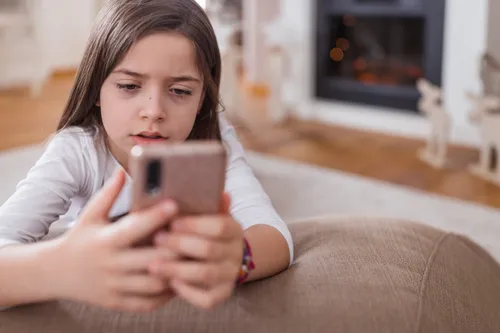
Navigating Mobile Phone Usage in Children
For parents of toddlers and young children, the topic of mobile phone usage might seem a long way off. However, forming healthy habits when it comes to mobile phones and social media starts at an early age, and is often shaped by the habits of the whole family. While there are many benefits to technology, there is also a wealth of research indicating that too much time spent on mobile phones can be damaging to mental health, particularly among children and those who spend excessive amounts of time on social media.

Mobile phones are a part of daily life for most adults, but increasingly so for younger generations, too. While the devices offer the opportunity to connect, a wealth of essential tools and even learn on the go, many parents are conscious of the ways phone usage might impact them long term. We recently carried out research with more than 600 parents, discussing a range of topics linked to their child’s mental health and the impact it has on the family – including how apps on their phone influence their behaviour.
The study revealed that two-thirds of parents have noticed changes in their child’s mood, self-esteem or behaviour that they believe may be linked to their use of social media platforms. However, 62% of parents said they do not monitor or control their child’s phone, so the exact extent of their usage is often difficult to determine. Reassuringly, however, our research showed that 75% of parents said their child was receptive to having discussions about safe and responsible social media use, indicating that open communication between parents and their children could work for both parties. So, what should this communication look like?
Exploring the ‘why’
Understanding the reasons for your child wanting to use a mobile phone is the first step to avoiding any issues when it comes to overuse and addiction. Firstly, consider what kind of activities your child carries out when they are on a phone – are they playing games, watching YouTube tutorials, exploring interests and hobbies, or taking photos and videos, for example? Is it the activity they are drawn to, or is it the device that enables them to carry out? By identifying the ‘why’, you can look at alternative ways to meet these needs. For example, if they are simply using your phone as a portable TV screen, reverting back to a traditional TV at set times can be a good way to regain control and set boundaries with how much screen time you feel is appropriate for them.
Modelling healthy behaviour
One of the most effective approaches to any changes in habits, particularly with young children, is to model healthy behaviour yourself. If you are asking your child not to spend time on their phone at mealtimes, think about how you and other people in the family use phones during these periods too. Be honest with yourself and with your child and be open if you are finding it difficult to move away from using your phone. This will help them to understand the importance of stepping back and enjoying screen-free time.
Understanding the benefits
While excessive phone use is damaging to people of all ages, there are also a lot of benefits to age-appropriate mobile phone use. Things are likely to be very different now compared to when you were a child. Today phones, the internet, gaming and technology are how young people connect, socialise, interact, learn and grow. Research even shows that certain brain games and exercises can help to slow the ageing process in adults, while using technology can help children with problem-solving skills. Recognising the importance of this for your child rather than making the devices forbidden or innately ‘bad’ can help to create a healthier attitude.
As with so many issues when it comes to parenting, mobile phone usage is nuanced and the right solution for you and your family will be different to what works for others. Rather than setting a blanket rule for the most socially appropriate age to give your child their own phone, consider how their usage might look and what will be the healthiest approach for them and you. If you feel that you need additional support, or if you require specific advice around addictions and addictive habits, contact a professional counsellor or charity that has knowledge in this area.
Written by Suzanne Alderson, founder of Parenting Mental Health













































